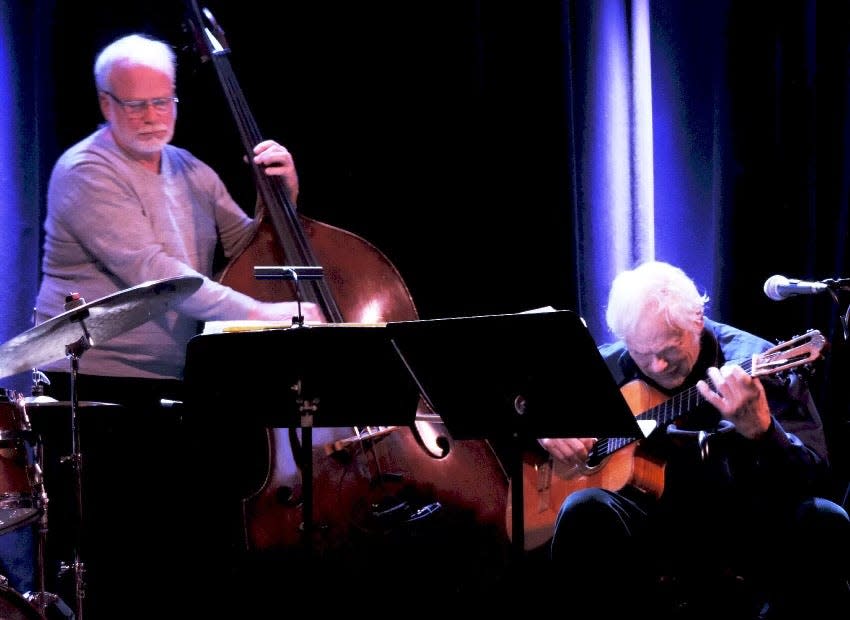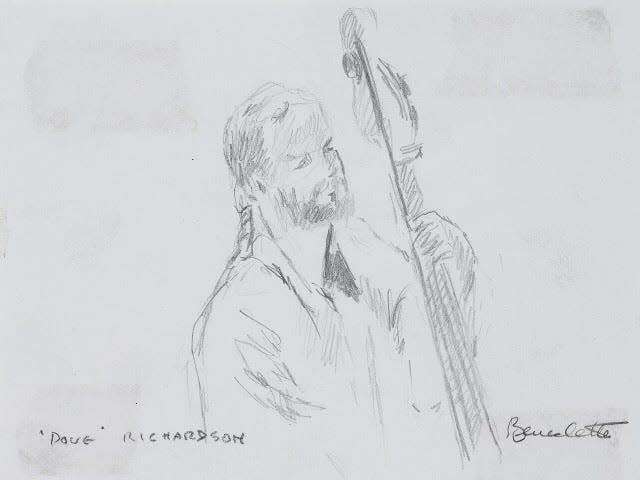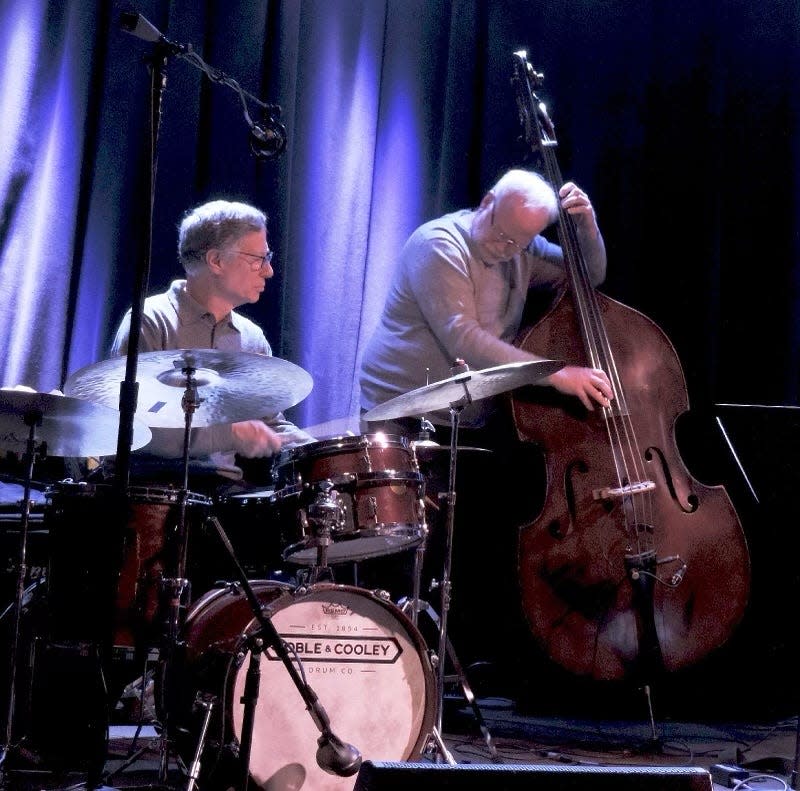Retired Denison music professor reflects on touring with Tony Bennett

- Oops!Something went wrong.Please try again later.
- Oops!Something went wrong.Please try again later.
It was his golden voice that sustained Tony Bennett as an emblem of the Great American Songbook for nearly a century — from his debut album "Because of You" in 1952, all the way to his last album in 2021, "Love for Sale" with Lady Gaga, released shortly after he turned 95 years old.
The highly decorated crooner perfected what many regarded as an "elusive" voice, with a nearly unclassifiable, scratchy-yet-soft timbre that made him, in Frank Sinatra’s words, “the best singer in the business.”
Equally impressive was Bennett's capacity to keep performing up until his final years. His last public performance was with Lady Gaga in 2021 at Radio City Music Hall, in a show titled “One Last Time."
But central Ohio native Doug Richeson, who toured with Bennett as his bassist for a number of years, knew the man behind the public image.
Decades ago, Richeson and Bennett traveled the globe together, recorded three Grammy-award-winning albums and performed at world-renowned venues like Carnegie Hall, all in the span of Bennett’s 1993 tour. More than musical collaborators, the pair became friends — the jazz legend even painted several portraits of Richeson, and gave him a gold watch during their time working together.
And on July 21, when Richeson woke up to the news that Bennett had died at the age of 96, the recently retired Denison music professor reacted as any long-time friend would.
“(Bennett) left a strong mark in this world. I'll miss him, even though I haven't talked to him in...25 years," said Richeson, 70, who now lives in Canton, Michigan.
A 'phenomenal' gig
A Dispatch interview with the Ohioan in 1994 — in the midst of his four busy years on the road with Bennett — shows an up-and-coming musician trying to soak in a wave of success, and relish time spent alongside an American music legend.
In the article, Richeson is quoted saying, "We were backstage during the filming of (NBC special) 'Legend to Legend,' and I'm thinking to myself: 'Man, I'm sitting here in the green room rapping with Muhammad Ali. And right across the room is Gregory Peck.' I've circled the world with this gig. It's been phenomenal."
Talking to Richeson today, the seasoned musician has now been in the industry for nearly five decades, and he carries a "two things can be true at once" mentality about the field, acknowledging both its rewards and challenges.
For example, Richeson will tell you that he absolutely loves what he does, but he also understands music performance can be a grueling career path, and he’s somewhat grateful neither of his two sons decided to follow in his footsteps.
“You may have the talent, but if you don’t know the right people and make the right contacts, your career kind of sits idle,” Richeson said.
And he’ll be quick to gush about Bennet as a remarkable person. But he’ll speak candidly about the expectations placed upon Bennett’s backup musicians, otherwise known as the “Ralph Sharon” trio: Clayton Cameron on drums, Sharon on piano and Richeson on standing bass.

Touring with Bennett, Richeson said, “was not like a … jazz gig, where I have total freedom and can do anything I want. You can’t do that. With Tony, you have a framework, and you have to do the best you can to communicate that framework.”
The extent of his improvisation, Richeson said, might involve approaching the bass line a tad differently from night-to-night. But, for the most part, he didn't stray too far from Bennett's playbook.
“I try to keep it consistent because Tony wants consistency, too. He wants to feel secure. And so, you can’t be doing a lot of improvisation and make him feel insecure. Because, if that happens, you’re going to get an ass-whooping after the show,” Richeson quipped with a laugh textured with age.
Also, Richeson praised Bennett’s musicianship, and his ability to show off his “jazz roots” while invigorating standards with his “pop tendencies.” But Richeson also said that Bennett’s musical integrity might have, at times, been comprised by an industry rapidly moving away from the standards Bennett performed so well.
Richeson remembered, while touring from 1993 through 1997, how Bennett would accept gigs alongside rock bands that were seemingly way off base from his brand.
“It was a marketing thing for (Bennett) to get his face out there with younger generations, younger musicians. Before I started, they were pushing him in front of…the (Red) Hot Chili Peppers,” Richeson said.

What's next for Richeson?
Jazz in Columbus: Beyond the Jazz & Rib Fest: What you need to know about Columbus jazz joints
Over the years, Richeson's career has taken some ironic twists and turns.
The college dropout who fell out of stints at both Ohio State University and University of Cincinnati’s music programs now boasts Capital University and Denison University faculty positions on his resume.
What motivated the naturally gifted musician to drop out of music school? Well, a quick glance at the number of symphony positions offered in the United States relative to the people graduating with music degrees helped make the decision for him.
Or, in Richeson’s words: “These colleges are cranking out hundreds of bass players a year and there’s maybe six openings a year.”
But what has Richeson been doing since 2001? Serving as the principal bassist for the Newark-Granville Symphony Orchestra.
And finally, even though, in his 1994 Dispatch interview, Richeson expressed the utmost gratitude to Columbus for "affording him the opportunity" to work as a freelance musician at jazz venues across the area, he doesn't wish to return to the city anytime soon.
Today, Richeson runs his own business repairing string instruments, and still performs from time to time. Though he anticipates things will pick up now that, post-pandemic, his concerns about large gatherings have reduced.
"Hopefully, I’ll find a new avenue here (in Michigan) and it’ll start rocking and rolling again. We’ll see," he said.
gtucker@dispatch.com
@tucker0527
This article originally appeared on The Columbus Dispatch: Local bassist reflects on time touring with the late Tony Bennett

